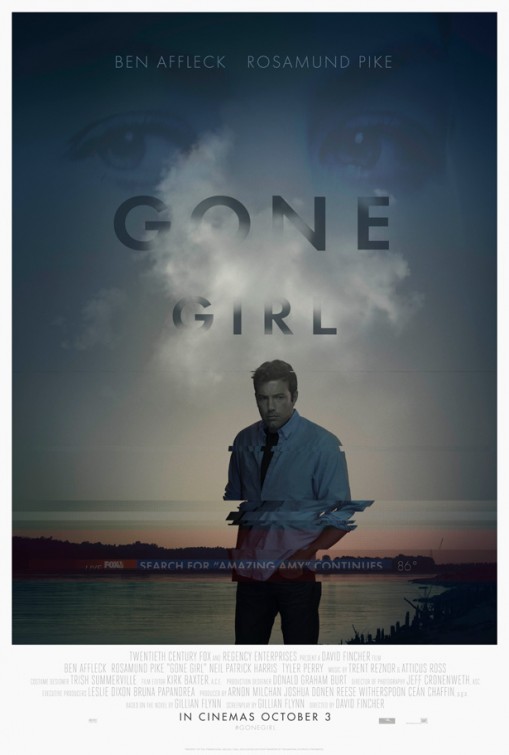You Don’t Know What You’ve Got ‘Til It’s..
Director
David Fincher
Starring
Ben Affleck
Rosamund Pike
Carrie Coon
Kim Dickens
Gone Girl opens the morning of Nick Dunne’s [Affleck] fifth anniversary to his wife Amy Elliott-Dunne [Pike]. He calmly leaves the house and eventually finds his way to the bar co-owned by him and his sister, Margo [Coon]. Following a conversation and a quick drink, he returns home to find his wife missing and a slightly disturbed living room scene. Detective Boney [Dickens] arrives and immediately begins investigating the premises. From here, the story quickly escalates as the media portray different images of Nick as a loving husband, to an incestuous murderer. All the while, the audience is treated to carefully written excerpts from Amy’s diary, detailing her relationship with Nick and her fear that he may indeed kill her. As the story unfolds, we quickly learn that not everything is as it appears and the entire focus of the story shifts dramatically. Vague description, I know, but any depth or detail pretty much ruins the story.
This film is a masterfully crafted release, a twisted dark Hitchcockian (almost noir-like) thriller masquerading as a simple drama with so many themes working away: honesty, manipulation, neglect, paranoia, betrayal and the psychotic subversion of a writer’s mindset – not to mention the effect of the economic recession on a relationship and media smothering and speculation. The projects Fincher chooses to work on are forming a very specific pattern. Not in a negative way, you understand, but a natural magnetism to specific story types. If anything, this is probably the perfect marriage of director and source material. The cold, calculating, unrelenting precision of Fincher’s fifty-take perfectionism mirroring the psychotic planning and absurdity of the actual storyline as it cascades and unravels is wonderful. It’s like two of your friends falling in love and you can’t help but mutter how utterly and succinctly they were made for each other. Sure, Fincher has created more visceral and some would say more entertaining releases in the past, he’s also created projects that contain more detail, layering and character development but Gone Girl really comes across as the first project that Fincher could have actually written himself.
The central performances are career bests. For Affleck, that’s a bold statement as I hold him in high regard and his last few outings have been incredibly impressive. For Pike, it’s a complete shock. I’m not saying that she’s in any way incompetent but the projects she’s been attached to have never really challenged her to produce a performance of this complexity and intriguing direction. Again, to discuss too much gives away huge chunks of the plot, so I will choose my words carefully. As products of a media-fuelled environment, our impressions of individuals stem largely from pre-judgements, standout incidents and coercion. Both the script and the performances cleverly manipulate these attributes to pull the audience back-and-forth, leaving them unable to make a firm decision one way or another. And I’m not speaking about plot progression or overall story reveals but character motivation and personality exploration; in other words, the plot takes the concept of marriage (sharing a life with a stranger), presents you with a series of facts and expects you to form an opinion of these individuals. Once you’ve got a fairly solid notion, the story and performances reveal something different and you’re left a little lost and confused. All of which is propped up by the mirrored confusion and speculation stemming from the supporting characters, acting as the audience’s subconscious thought patterns personified. Even any small plot hole can be addressed with the argument of people’s personal judgements and prejudices overriding their common sense; ignoring what’s obviously in front of you because it would unspool everything else. In other words, it’s neater to believe the lie than investigate the truth.
Anything I ever have to say about a Reznor/Ross score is always going to be an impassioned love-letter, swooning over the artistic and subtle alternative genius at work. So brace yourself. With Reznor being a classically trained musician on top of an industrial artist, he is used to not only creating signature music but forging his own sounds; evident by his work on The Social Network and The Girl With The Dragon Tattoo. The score is surprisingly soft and subdued, lulling the audience into a false sense of security but its undertone of erratic electronic pulses and hums gives you the impression that something is clearly wrong under the surface; that you’re being tricked into believing everything is alright. Same goes with the cinematography or editing for that matter. With Jeff Cronenweth and Kirk Baxter (as well as the Reznor/Ross combo) Fincher has amassed his core unit of exceptional cinema. A lot of praise for various releases can be garnered to the specific components that work well but with these five individuals working in harmony, you can almost guarantee a feature which will be striking, immersive, compelling and haunting.
I think the key element when watching this film, is not to try and take in the narrative but allow yourself to explore the motivational influences of the characters. In a quasi-similar way to Revolutionary Road, the story and actions are not the key talking points after the film, the reasons, limits and potential actions are where the curious discussions lie.
Release Date:
3rd October 2014
The Scene To Look Out For:
**Enormous spoiler**
Once the film changes direction and we start to follow Amy’s narrative, everything takes an interesting turn. It’s one thing to witness the actions of a controlling psychopath pulling the strings from the past, it’s another thing entirely to see how her mind works as she quickly improvises. If anything, seeing how unhinged individuals adapt when plans fall to the roadside is more tense and unnerving than examining the level of detail that went into said plan in the first place.
Notable Characters:
**This paragraph is also spoilery**
Without a doubt, Affleck and Pike are the central focus and rightfully so. I also mentioned the supports being just as vital and speaking for the audience. The only individual who doesn’t seem to do that is Desi Collings, played by Neil Patrick Harris. A character mentioned early on but only really turning up well into the film’s third act. From this point you can’t really tell who he is, what his motivations are or, more aptly and worryingly, what his limits are. Is he just a passionate, wealthy ex-boyfriend, or is he just as manipulative and deviant as Amy? Ultimately, I think that’s the audience’s call.
Highlighted Quote:
“We’re so cute I want to punch us in the face”
In A Few Words:
“An exemplary study the likes of which is rarely explored on film for fear of being too confusing or dull”
Total Score: 5/5
![The Red Right Hand Movie Reviews [Matthew Stogdon]](https://reviews.theredrighthand.co.uk/wp-content/uploads/2021/12/cropped-header1.png)




